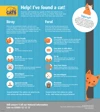Our Feral Guide has been written to provide comprehensive information to anyone interested in feral cats. It covers the welfare needs of feral cats, guides you through the process of trapping, includes information on working with your vets, feral kittens and has a resources section to support you through the stages of Trap, Neuter and Return.
The word 'feral' means members of a domesticated species that have reverted to living as wild animals. While they are often mistaken for stray cats, ferals have little or no contact with humans and cannot be tamed.
You can find out more about the difference between ferals and strays in our visual guide below.

Stray cats are socialised domestic cats who don't - or don't appear - to have an owner. Be wary; even if they 'stray' they might be a neighbourhood cat who's worked out that if they look hungry they can bag themselves a second meal!
Stray cats
Feral cats are the same species of cat as our pet cats, but are not socialised to humans or the domestic environment. This means they behave like wild animals.
Feral cats are likely to be
Cats learn what is normal at a very young age, during what is known as a 'socialisation period.' Between the ages of two to six weeks, kittens can learn to enjoy human contact, forming a bond and becoming great pets.
Feral cats are usually the offspring of stray, feral or abandoned cats and have missed out on this early experience, making them likely to be wary of humans.
Despite their wild nature, feral cats still need a level of care. With many ferals living in colonies, the cat population can grow quickly. Neutering and returning the cats to their colony stops continual breeding.
While most ferals are resourceful when it comes to finding food, it is good to keep an eye on them during the winter. If you suspect a feral cat is sick or injured, they can be trapped and taken to the vet.
Feral cats, or those born wild, are equally protected in law as domestic cats and are more susceptible to disease. Simply removing feral cats isn't a long-term solution - a new colony will often move in.
The best option is to neuter all of the feral cats within as short a time frame as possible, reducing the size of the colony. Cats Protection offers Trap, Neuter and Return schemes (TNR) for feral cats, which can help to limit disease.
If you'd like more information on feral neutering, please phone our helpline on 03000 12 12 12, choosing option 2 (lines open from 9.30am-1pm).
Trapping a feral cat to get them to the vets for neutering can be a stressful process – for the cat and the trapper. As feral cats are particularly scared of humans and don’t like being confined in small spaces, it can take a lot of time and effort.
To make sure an already neutered feral cat isn’t unnecessarily trapped, they will have their ear ‘tipped’ or 'notched'. This is where between a half centimetre and one centimetre of the tip of the left ear is removed while the cat is under anaesthetic. This serves as a permanent visual mark and can be seen from a distance.
Ear tipping doesn’t harm the cat as it is surgically removed by a veterinary professional while the cat is under anaesthetic. It heals quickly and has no lasting effects.


It’s important to remember that generally, cats don’t need company. Feral cats prefer not to be around humans so it’s better for their welfare if they are just trapped, neutered and returned to their home outdoors. They are wild animals and so find contact with humans very stressful, which is why a feral cat cannot be domesticated.
Feral kittens can sometimes be socialised, but this needs to be done early and by a professional. It takes a lot of time, effort and kitten know-how to successfully socialise feral kittens. Each situation is different and often trying to domesticate feral kittens can upset them and cause them a lot of stress. We would never recommend trying to socialise feral kittens yourself as there’s a lot to think about and consider.
If you find feral cats living near you, follow our advice above.
You may also hear about farm cats or barn cats. These tend to be feral cats on agricultural properties, usually living entirely outdoors (with access to shelter) to help with rodent control in the area.
Farm cats can thrive in these alternative cat homes. You do not always need to have stables or agricultural property to provide a loving home for feral cats, however, they may have specialist requirements different from a ‘pet cat’. These cats need independence and space to choose to be away from people but with a kind human to look out for them and provide access to shelter and potentially food, water and medical aid if they get unwell or need help. Plenty of outdoor space is also a must for rescued farm cats and kittens and never being confined indoors is also essential. For their welfare, feral or ‘farm cats’ should never be confined to a traditional pet home.